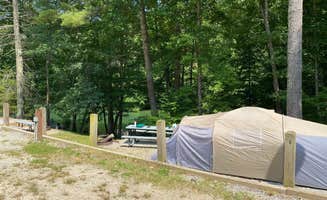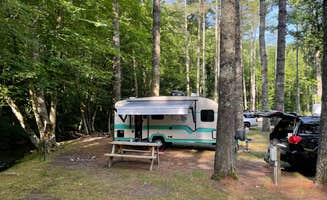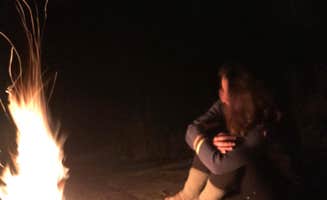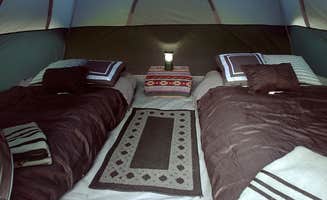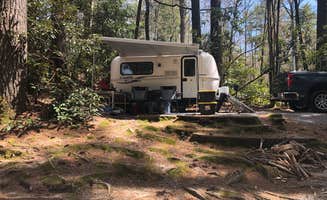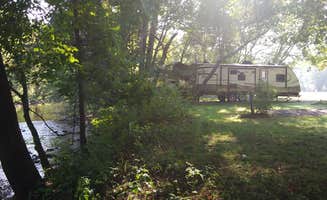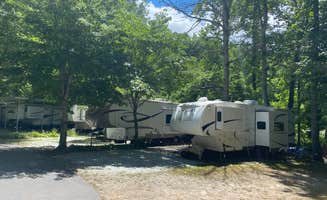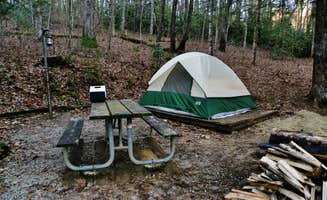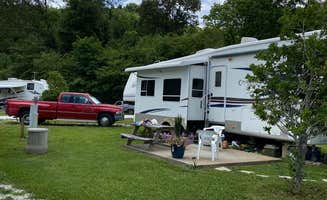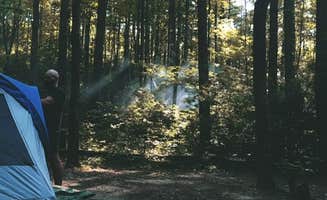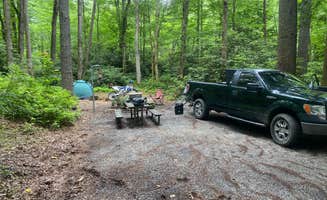Camping in the southern Appalachian Mountains near Glenville, North Carolina offers diverse terrain between 3,000 and 5,000 feet elevation. The higher altitude creates summer temperatures 10-15 degrees cooler than surrounding lowlands, making this region especially popular during hot months. Lake Glenville serves as a centerpiece for many campsites, sitting at 3,494 feet above sea level as the highest lake east of the Mississippi.
What to do
Waterfall hiking: 2.5 miles round trip to reach Rainbow Falls from Gorges State Park Campground. "Rainbow Falls, Turtle Back Falls and Bust your Ass Falls. The Visitors Center has free parking for RV's and Vans," notes one visitor. The campground offers both primitive sites and newer developed areas with full hookups.
Trout fishing: year-round access at multiple streams and lakes. "Cliffside Lake just up the hill from the campground has lots of big and pretty dumb stocked trout and some giant uncatchable bass. For the trout, get your line way out there and fish with bait under a bobber," explains a visitor to Van Hook Glade, located about 25 minutes from Glenville.
Mountain biking: extensive trail network starting near Davidson River. "If you're looking to ride the mtb trails you're in luck. They start literally across the davidson river from the campground," shares one camper. The trails accommodate various skill levels with technical sections for experienced riders.
What campers like
Primitive backcountry solitude: "There are many spots nearby to fish or hike including the nearby Cliffside Lake Rec. Cliffside Lake is stocked with trout and there is a great hike to Ranger Falls here," notes a camper about Van Hook Glade. The nearby mountains offer numerous secluded spots for experienced campers.
Lake swimming access: Devils Fork State Park Campground provides direct access to Lake Jocassee. "Beautifully located on Lake Jocassee! Camp sites paved, wooded and nicely spaced. The lake is gorgeous. Boat ramp and trailer parking. Kayak rentals available," explains one visitor. The clear mountain waters provide refreshing swimming during summer months.
Established facilities: The newer campground at Gorges State Park offers modern conveniences. "The park has had primitive camping for years, but this year is the first season with an area for RVs/trailers and a separate area tent campers. All sites are level with concrete pads, except for the tent site. Fire pit is on bricks. Bathhouse is immaculate."
What you should know
Bear activity requires preparation: Bears are common throughout the region, especially in backcountry areas. "Be aware that the bears here are extremely bad. I actually had an encounter with a very large bear who charged my group and destroyed at tent," warns a camper at Panthertown Valley Backcountry Area. Always use bear-resistant food storage containers or hang food properly away from camp.
Reservation timing varies widely: Most established campgrounds fill quickly during peak season. "It seems to always be booked up when I want to go back," notes a visitor about Van Hook Glade. For popular spots like Devils Fork, one camper simply advises: "Reserve well in advance."
Weather changes rapidly: Mountain elevations create unpredictable conditions year-round. "When we first arrived, we were met with the fact that the staff had changed our campsite to #1. Their excuse was that our campsite was closed because of dangerous trees," reports a camper at Davidson River, highlighting how storms can alter camping plans with little notice.
Tips for camping with families
Choose campgrounds with swimming options: "So much for family's to do here. We stopped by to check it out on our way to another site and wished they had a spot available. We will be booking this for another time. Water is so clear. Site is so clean," notes a visitor about Devils Fork State Park, where the lake provides safe swimming areas.
Consider multi-activity parks: Table Rock State Park Campground offers diverse recreation within walking distance. "In the park, you can swim, hike, camp, fish and kayak. You will see some excellent views of the mountain ranges. We saw deer, squirrels, birds, snakes, and many salamanders," explains one visitor. The variety keeps children engaged throughout your stay.
Review site layouts before booking: Many campgrounds in the mountains have challenging terrain. "Being regular tent campers, we understand that sometimes you are at the mercy of your neighbors. The people staying across from us decided that 1030 was the time to start blaring music and screaming," reports a camper at Oconee State Park, highlighting the importance of selecting sites with adequate privacy for families.
Tips from RVers
Measure access roads carefully: Mountain roads present challenges for larger vehicles. "The road is a steep grade up to the campground. There are several overlooks on the way," notes a camper at Black Rock Mountain State Park. RVs longer than 25 feet may struggle on certain access roads and campground loops.
Select level sites when possible: Mountain terrain creates uneven camping pads. "Be aware, however, that camper pads on the odd-numbered tent sites (5, 7, 9, 11, 13, and 15) are not level, but Sites 1 and 3 plus the even-numbered sites have level parking pads," advises a visitor to Ralph J. Andrews Campground in Glenville.
Consider utilities when selecting sites: "It has a few full RV hookups, 10 or so el/water sites&12 or so primitive," explains a camper about Ralph J. Andrews County Park. The limited number of hookup sites means early booking is essential, especially during busy summer months when the cooler mountain temperatures attract visitors.


